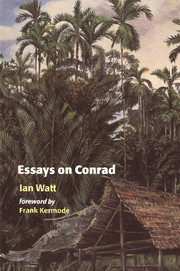Book contents
- Frontmatter
- Contents
- Foreword
- Acknowledgements
- Chapter 1 Joseph Conrad: alienation and commitment
- Chapter 2 Almayer's Folly: introduction
- Chapter 3 Conrad criticism and The Nigger of the ‘Narcissus’
- Chapter 4 Conrad's Heart of Darkness and the critics
- Chapter 5 Comedy and humour in Typhoon
- Chapter 6 The political and social background of The Secret Agent
- Chapter 7 ‘The Secret Sharer’: introduction
- Chapter 8 Conrad, James and Chance
- Chapter 9 Story and idea in Conrad's The Shadow-Line
- Chapter 10 The decline of the decline: notes on Conrad's reputation
- Chapter 11 Around Conrad's grave in the Canterbury cemetery – a retrospect
- Chapter 12 ‘The Bridge over the River Kwai’ as myth
- Index
Chapter 4 - Conrad's Heart of Darkness and the critics
Published online by Cambridge University Press: 22 September 2009
- Frontmatter
- Contents
- Foreword
- Acknowledgements
- Chapter 1 Joseph Conrad: alienation and commitment
- Chapter 2 Almayer's Folly: introduction
- Chapter 3 Conrad criticism and The Nigger of the ‘Narcissus’
- Chapter 4 Conrad's Heart of Darkness and the critics
- Chapter 5 Comedy and humour in Typhoon
- Chapter 6 The political and social background of The Secret Agent
- Chapter 7 ‘The Secret Sharer’: introduction
- Chapter 8 Conrad, James and Chance
- Chapter 9 Story and idea in Conrad's The Shadow-Line
- Chapter 10 The decline of the decline: notes on Conrad's reputation
- Chapter 11 Around Conrad's grave in the Canterbury cemetery – a retrospect
- Chapter 12 ‘The Bridge over the River Kwai’ as myth
- Index
Summary
You may be surprised to learn that this is a very big topic, and that I'm not going to attempt more than a sketch of one of its aspects: the question of Conrad's attitude to racism, to colonialism, and to Africa. From its first appearance in 1899, for the thousandth number of Blackwood's Magazine, Heart of Darkness has been considered a major attack on the horrors perpetrated in the Belgian Congo by Leopold, King of the Belgians, and his agents. When he broached the project to Blackwood, Conrad was aware of this element in the story, and said that ‘the criminality of inefficiency and pure selfishness when tackling the civilizing work in Africa is a justifiable idea’. In answer to a letter of praise from Cunninghame Graham for the first installment – Graham's term for Empire was ‘The Stock Exchange Militant’ – Conrad was again on the defensive, warning his radical friend that the latter two installments of the story might disappoint him, after the first one where ‘the note struck chimes in with your convictions’. So Conrad – who had been to the Congo in 1890 – knew that the first installment could be read as anti-imperialist, although not the story as a whole. In any case the general assumption that the story was, among other things, an attack on the atrocities on the Congo, was generally accepted.
At least, that is, until 1975, when the well-known Nigerian novelist Chinua Achebe made a vigorous attack.
- Type
- Chapter
- Information
- Essays on Conrad , pp. 85 - 96Publisher: Cambridge University PressPrint publication year: 2000

